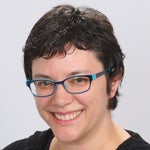by Jenny Kreiger
Dr. Melanie Grunow Sobocinski graduated from IPCAA in 2002. After working as a  tenure-track assistant professor of art history for several years, she left the academic mainstream to start her own business as a productivity coach. I met with her at the AIA/SCS Annual Meeting in January 2015 to learn more about where she is now and how she got there.
tenure-track assistant professor of art history for several years, she left the academic mainstream to start her own business as a productivity coach. I met with her at the AIA/SCS Annual Meeting in January 2015 to learn more about where she is now and how she got there.
On her current position:
Melanie founded Prof Organizer LLC, a small business providing consultation on organization, time management, and productivity to faculty, graduate students, and academic staff. She says that her goal is to “help academics get their act together” when they feel overwhelmed by workloads and work-life imbalance. To do this, she works closely with her clients on everything from organizing their desk spaces to setting priorities that will help them meet their professional and personal goals. Having been through the rigors of IPCAA and several years as full-time faculty, Melanie has seen and experienced many of the challenges of academic life firsthand. She reminds her clients that getting organized is not a one-time effort but rather “an ongoing process” that academics must practice throughout their careers.
On her path from IPCAA to where she is now:
Melanie’s serious interest in getting organized began in graduate school.
“My interest in organizing and time management had been a strong thread in my career ever since I hit the wall at the dissertation stage, realized that I had no clue about what I was doing, and figured out that I needed to get my act together,” she said. “And I decided I didn’t want to reinvent the wheel. I wanted to find out what other people were doing. So I started reading the time management and organization and academic productivity literature. So I’ve been doing that really as long as I’ve been doing academic research.”
Getting organized helped Melanie accomplish more than she thought possible in her professional life while also allowing her to do the things she wanted outside of work. Seeing her students and colleagues struggling with problems that a little organizational skill could fix, she began offering advice to those around her.
On her choice to leave mainstream academia:
“It was a hard choice to leave the academic position,” Melanie explained, “but there were a number of aspects of it where I felt torn, like I needed to squish myself into just teaching the art history, just being a professor, and I really wanted to branch out and explore time management and organization more broadly.”
Two years before leaving her tenure-track position, Melanie thought hard about what she wanted to accomplish, and becoming a professional organizer ranked high on the list. She decided to devote some of her remaining time in the university setting to preparation for her new career. She led workshops on productivity for undergraduate students and academic staff, built collaborative relationships outside her university, and saved money to help with the transition.
Ongoing collaborative research and publication has helped Melanie bridge her two careers. During the last few years, she has been co-editing The Oxford Handbook of Roman Sculpture (Oxford University Press, 2015), and the intermittent periods of intense work on that project have allowed her time to build her client base. She finds that collaborative projects are much more enjoyable (and progress much more quickly) now that she can undertake them on her own terms as an independent scholar not confined by traditional academic workflows.
“I still think along the model of teaching, research, and service,” she noted. “I’ve just re-balanced their relative emphasis.”
On IPCAA and the useful skills it gave her:
When asked to name the good choices that started her on the path to her current position, Melanie enthusiastically responded, “I picked IPCAA!” She credits IPCAA with giving her opportunities to teach and especially to improve her teaching. IPCAA faculty also helped her learn how to build good arguments and express them in academic prose. These skills, along with her experience in the tenure track, give her credibility with her clients and the ability to communicate effectively with individuals or groups.
IPCAA also helped Melanie clarify her relationship to her academic field and its importance in the broad scheme of her life.
Speaking of her academic pursuits, she explained, “Even in graduate school, I had always said, ‘This is what I’m going to do for the love of the learning, and I’m going to do it as long as it’s financially feasible.’ … Living the life I love includes this, but it’s not limited to this.”
On her plans for the future:
Asked to describe where she sees herself in five years, Melanie expressed a desire for more of the same fulfilling experiences she has had since leaving the tenure track. She plans to remain engaged in scholarship, although she does not know exactly what form that work will take. She hopes to build her client roster, travel to lead workshops at universities around the country, and perhaps organize some dissertation support groups. She looks forward to “enjoying lavish amounts of time with my family and my kids” and traveling with them when schedules allow. Blogging about academic productivity continues to be a priority, and writing a book on that subject is not out of the picture.
As daunting as carving one’s own path outside the tenure track and into the realm of entrepreneurship can be, Melanie obviously faces it with relish for the challenge and passion for her work.
“I get to design my life,” she affirmed. It is clearly a labor of love.
Learn more about Melanie and Prof Organizer LLC at http://proforganizer.com.
Photo courtesy of Melanie Grunow Sobocinski.

